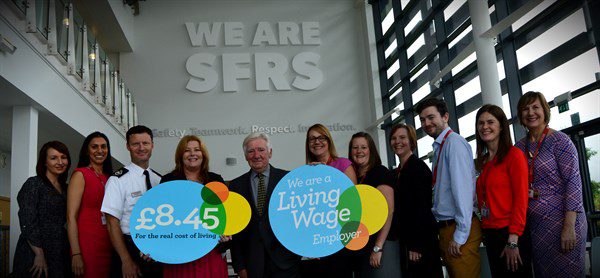The Scottish Fire & Rescue Service (SFRS) has been accredited as a Living Wage employer with the Scottish Living Wage Accreditation Initiative.
Their Living Wage re-affirms the SFRS’ long standing commitment to ensuring a Living Wage for all employees and third-party contracted staff.
The national living wage is £8.45 an hour – significantly higher than the statutory minimum for over 25s of £7.50 per hour introduced in April 2017.
The real Living Wage is an hourly rate set independently, updated annually and is calculated according to the real costs of living.
Liz Barnes, SFRS’ Head of Human Resources, said: “The Scottish Fire and Rescue Service is committed to fairness and supporting those on the lowest incomes.
“We recognise the real difference the Living Wage can make, and we want to make sure that every person who works for us, whether they are full time staff or third-party contractors, has that peace of mind.
“Introducing the Living Wage is not only the right thing to do for our people; it can also bring real benefits to employers.
“Research published highlighted enhanced productivity, reduced absenteeism and better staff morale as just some of its potential benefits.
“The SFRS has been paying all of our people above the level of the Living Wage for some time but now we are happy to say that we are amongst the number of officially accredited employers.”
The SFRS, like all accredited employers, choses to pay the real Living Wage on a voluntary basis.
Peter Kelly, Director of the Poverty Alliance said: “Paying at least the real Living Wage allows those in work to become more included in society, better provide for their families, and feel that their value and hard work is recognised by their employer.
“We are delighted to congratulate Scottish Fire & Rescue Service on becoming a Living Wage employer, joining the growing movement of over 800 companies in Scotland who want to go further than the government minimum.
“This is an unambiguous statement that the service is committed to fair dealing in their business practices.”





